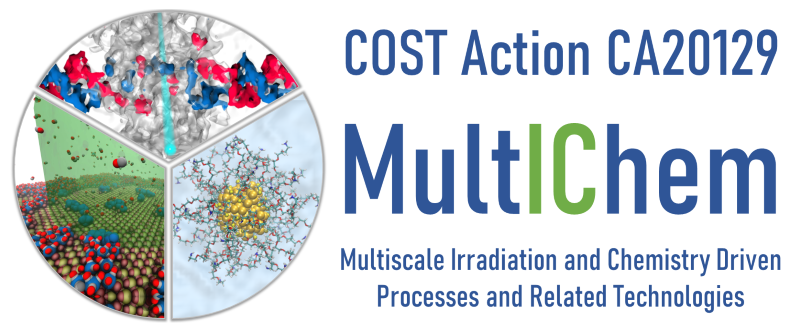Training School on Multiscale computational and experimental studies of irradiation-driven chemistry processes
The 1st Training School of the COST Action MultIChem will take place at the Instituto Superior Técnico (Lisbon, Portugal) during October 03-07, 2022. The School is aimed to train the MultIChem Action's participants (with a particular focus on Young Researchers and Investigators) in state-of-the-art theoretical, computational and experimental methods for studying the Irradiation-Driven Chemistry processes in (bio)molecular and nanoscale systems.

The 5-days-long School will be organized in the form of general lectures and hands-on practical tutorials. The lectures and tutorials will be given by experts in atomic and molecular physics, theoretical physics, physical chemistry, radiation physics and chemistry, and multiscale computational modeling. The School will also contribute to the networking activities of the COST Action and foster potential collaborations among the MultIChem participants. The hands-on tutorials will be devoted to the exploration of physical models and computational approaches used for the simulations of Meso-Bio-Nano (MBN) systems and the investigation of their structure and dynamics at the atomic level of detail. In particular, the case studies of atomic & molecular clusters and nanoparticles; biomolecular systems; nanomaterials; composite materials and material interfaces; as well as dynamical, chemical, collision- and irradiation-driven multiscale phenomena will be discussed. Relevant physical concepts, mathematical techniques and computational methods will be introduced, including force fields and algorithms used in molecular modeling, molecular dynamics (classical, reactive and irradiation-driven) and stochastic dynamics simulations. The tutorials will be based on practical exercises with the advanced software packages MBN Explorer and MBN Studio. The tutorials will be performed with the latest release of MBN Explorer and MBN Studio. The Training School is designed for graduate students, postdoctoral researchers and staff in computational physics, chemistry and biology, molecular physics, radiation physics and chemistry, materials science, nanoscience, and radiobiology, who seek to extend their research skills to include theoretical, computational and experimental expertise, as well as for all other researchers interested in state-of-the-art methods for studying radiation-driven physics and chemistry processes.
